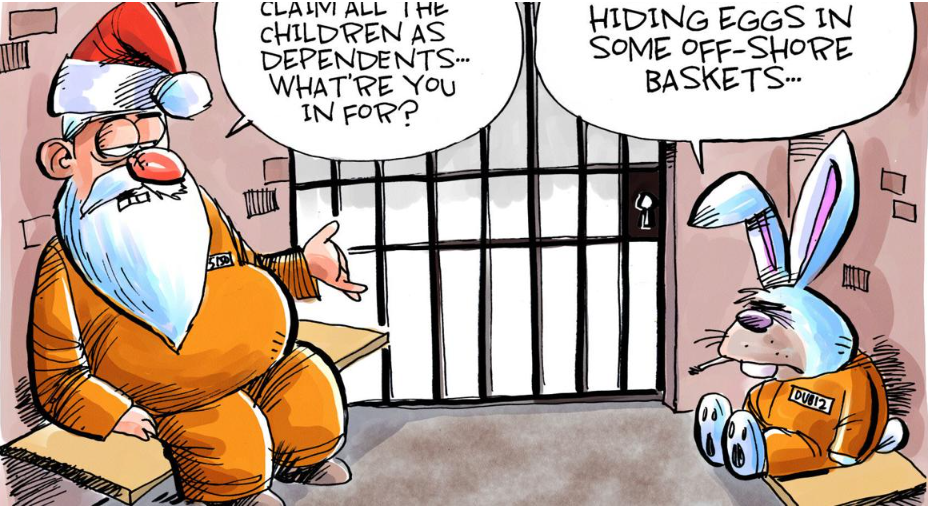We hope you’ve been following along with our emails especially yesterday’s email showing the proof directly from the IRS!
We know at first it can be a challenge to shift your gears of thinking from “don’t people go to prison for not paying their taxes?” To knowing there’s an actual LEGAL REMEDY to remove your income tax liability.
YES – people can go to prison for not paying their taxes but these people did not follow a proper remedy and when the IRS does prosecute someone – it doesn’t happen the way most people picture it in their mind…

The IRS doesn’t just IMMEDIATELY seize your money or come crashing down your door without warning.
Although it’s a private (not public or government owned agency)…
The IRS is all about bureaucracy!

The notice must include information telling you about your right to appeal the threatened collection action within 30 days.
Bureaucracy gives one the opportunity to put their legal remedy into place.
Normally, you will get a series of 4 or 5 notices from the IRS before they can garnish wages, seize your bank account or assets.
The second-to-last notice is also called ‘Notice of Intent to Levy’ (CP504), but doesn’t advise you of your right to a hearing. It also doesn’t give the IRS a right to take your assets. Only the last notice gives the IRS the legal right to levy.
The last notice is called “Final Notice. Notice Of Intent To Levy and Notice of Your Right to a Hearing”. This means you are running out of time before the IRS can levy your bank account. The final notice is an LT11 or L1058 (and others as well).
Here are the common collection letters the IRS mails to individuals:
- CP14 (Notice of unpaid taxes)
- CP501 (Reminder of unpaid taxes)
- CP503 (Second reminder of unpaid taxes)
- CP504 (Notice of Intent to Levy) May seize state tax refund by stated deadline.
- Letter 1058 or LT 11 and other letters (Final Notice. Notice of Intent to Levy and Notice of Rights to Appeal).
The first three notices are sent by regular mail & the final two by certified mail.
The point is, the IRS will always notify you (multiple times) before pursuing legal action. Now you know that you always have a right to appeal – from day one.

What goes wrong for the tax frauds that end up in prison?
In one way or another – they didn’t carry out their “tax remedy” properly.
Most of which didn’t have a real remedy to begin with…
Here are some of the most common examples:
Tax Avoidance (Skirts the line, can sometimes be considered evasion)
- Off-shore Tax Havens
- Corporate Tax Credits & Loopholes
- Certain Tax Shelters (like non-profits, welfare organizations)
- Trust webs
The success of using these types of strategies for the purpose of reducing one’s income taxes varies greatly depending on how one is operating them.
Without evidence of fraud or other criminal activity, the IRS will typically assume you have made an honest mistake on your returns.
That’s about the extent of the agency’s willingness to forgive, however, as even unintentional mistakes can result in a 20% penalty to the taxpayer.
There are certainly circumstances in which the IRS assumes an error is actually a deliberate attempt at fraud. In these situations, the taxpayer can face serious consequences, including prison time.
Tax Fraud (illegal)
- Underreporting income (Fails to report all income)
- Using a false Social Security number
- Makes false or fraudulent claims
- Falsifying documents (filing a fraudulent return)
- Willfully fails to file a federal income tax return
- Intentionally fails to pay taxes owed
When that happens, many will turn to experienced tax law attorneys to help them resolve disputes. In some cases, negotiations can lead to resolution of the issue without any criminal charges (usually through a payment plan); in other cases (usually when they cannot get the amount of money owed or if there are multiple counts of fraud), vigorous representation in court is required.
This special redemption is wholly and completely different from any “tax reduction methods” listed above.
We hope this has helped put your mind at ease a bit knowing that the IRS can’t just come in and bust down your door or seize assets without warning.
But in case all that weren’t enough, just know that the law also protects you from ever being prosecuted for attempting to put this legal remedy into practice.
Aren’t you ready to discover the secret tax redemption the elite have been hiding for centuries?
Join Elite Tax Secrets and learn the simple method to enjoy 100% tax non-obligation status for life.
Learn More About Elite Tax Secrets
Your friends in finance,
Private Wealth Academy
Leave a Reply
You must be logged in to post a comment.